COVID-Related Research
From 2020-2024, I conducted interviews with experts who designed policy around COVID-19 and residents of three Chicago neighborhoods: Austin, Little Village and Albany Park.
Emergency: COVID-19 and the Uneven Valuation of Life (2024, University of Chicago Press), examines how public health metrics and state bureaucrats’ policy decision-making exacerbate race, class and legal disparities in COVID-19 infection and deaths. Drawing on interviews with federal, state and local policymakers and experts, as well as residents of three racially and economically disadvantaged neighborhoods in Chicago, this project analyzes the “racial equity” framework adopted by the state of Illinois and city of Chicago to mitigate racial disparities in COVID-19 outcomes and assesses its success, from the perspective of those most marginalized by race, class and legal status.
I argue that COVID-19 represents and reifies the convergence of three emergencies. First, I argue that the federal and local governments governed through emergency, enacting temporally-bounded governmental strategies that presumed scarcity, triaged care, and naturalized structural inequality by delinking the effects of racism from its causes. This temporary emergency response was spectacular and anticipatory – designed to safeguard the status quo until “normalcy” could be restored. But such an approach invisibilized and exacerbated two longer-term endemic emergencies already taking place: 2) the slow emergencies racially marginalized populations have faced for decades due to neoliberal restructuring and the fragmentation of care infrastructure, and 3) the sacrifice of lower-income frontline workers to premature death to safeguard the economy & protect the middle-class. Each of these three emergencies operate along distinct temporalities, invoke divergent politics of visibility, and are governed with unique strategies of exclusion.
JUMP TO PRESS COVERAGE OF THE COVID PROJECT POLICY REPORT
Reviews
Barnard, Alexander. 2025. “Emergency: COVID-19 and the Uneven Valuation of Life.” Social Forces soaf094, 7/9/25.
Sowemimo, Annabel. 2025. “The Racial Injustice Laid Bare by COVID Must Not Be Forgotten.” Nature 638(8052):883–84, 2/24/25.
-
Articles
Decoteau, Claire Laurier, Cal Lee Garrett, and Tirza Ochrach-Konradi. 2025. “Declaring Racism a Public Health Crisis.” Social Science & Medicine 118086. doi: 10.1016/j.socscimed.2025.118086.
Decoteau, Claire Laurier, AJ Golio, and Cal Lee Garrett. 2025. “The Risks of Renting on the Margins: Housing Informality and State Legibility in the COVID-19 Pandemic.” American Sociological Review. DOI: 10.1177/00031224241307343
Decoteau, Claire Laurier. 2024. “The Entangled Emergencies of COVID-19.” Sociological Theory 42, 2 (June): 97-113. https://doi.org/10.1177/07352751241247567
Garrett, Cal Lee and Claire Laurier Decoteau. 2023. “Data Citizenship: Quantifying Structural Racism in COVID-19 and Beyond.” Big Data & Society 10(2): https://doi.org/10.1177/20539517231213821.
Decoteau, Claire Laurier and Cal Lee Garrett. 2022. “Disease Surveillance Infrastructure and the Economization of Public Health.” Sociology of Health & Illness. 44: 1251-1269.
-
Talks
Invited Speaker, 2025 Book talk co-sponsored by the Institute for Society & Genetics and Rangell Social Medicine Grand Rounds Series, University of California, Los Angeles “Emergency: COVID-19 & the Uneven Valuation of Life”
Invited Speaker, 2025 Science Studies Colloquium Series, University of California, San Diego “Emergency: COVID-19 and the Uneven Valuation of Life”
Invited Speaker, 2025 Colloquium Series, University of California, Berkeley “Emergency: COVID-19 and the Uneven Valuation of Life.”
Invited Speaker, 2025 Frontiers in Sociology series, Columbia University “Emergency: COVID-19 and the Uneven Valuation of Life.”
ESS Robin M. Williams Lecture, 2024. “Emergency: COVID-19 and the Uneven Valuation of Life.”
Coser Lecture, 2023. “Emergency: COVID-19 and the Uneven Valuation of Life.”
ASA Presidential Panel 2022, Understanding Vaccine Refusal. Paper: “Accumulated Distrust and the Racialization of Vaccine Policy and Hesitancy”
ASA Presidential Panel, 2022, A Sociology of Contagion, “COVID Emergencies: Acute Crises, Slow Emergency & the Uneven Valuation of Life”
ASA Invited Panelist 2021, Vaccinations in the Age of COVID, Culture & Contemporary Life Talk Series, Culture Section
Invited Speaker, Health Disparities and Structural Racism, Endemic/Epidemic, Medical Humanities & Social Medicine Series, 2020-2021, Johns Hopkins University
ASA Panel 2021, “Theorizing Crisis”; Paper: “COVID Emergencies: Acute Crises, Slow Emergencies and the Uneven Valuation of Life”
ASA Presidential Panel 2020, Sociological Perspective on COVID-19, “Techno-Politics and the Uneven Valuation of Life”
-
Reports, Op-Eds & Press
Harris, Joseph and Claire Laurier Decoteau. 2025. “Claire Decoteau on the COVID-19 Emergency and the Failure of Pandemic Response.” Global Health Politics Podcast Season 2, Episode 5, 9/28/25.
Golio, A. J., Cal Lee Garrett and Claire Laurier Decoteau. 2025. “What Can We Learn From COVID-Era Rental Assistance Programs?” Shelterforce, 7/18/25.
Decoteau, Claire Laurier, A. J. Golio, and Cal Lee Garrett. 2025. “The Risks of Renting on the Margins.” Marxist Sociology Blog, 2/27/25.
Decoteau quoted in: “Black, Hispanic Parents Say Access, Cost Keep Kids From COVID Vax: Poll,” by Jake Thomas, Newsweek, 7/26/22.
Decoteau, Claire. 2022. COVID may no longer feel like a crisis. But the social emergency it created is far from over. Opinion, San Francisco Chronicle, 3/31/22.
Thometz, Kristen. 2022. UIC Report Details Failures of Public Policy Responses to COVID-19 in Chicago. WTTW/PBS, 3/4/22.
Decoteau, Claire and Cal Garrett. 2022. To protect vulnerable Chicagoans, rental assistance must recognize informal arrangements. Opinion, Chicago Tribune, 1/5/22
December 2021. Deadly Disparities in the Time of COVID-19: How Public Policy Fails Black and Latinx Chicagoans. IRRPP Report.
Decoteau, Claire. Why Are Poor Americans Resisting the Vaccine? Because COVID is the Least of Their Problems. Opinion. Newsweek. 11/5/2021
IRRPP UCAN Report Launch
For Black History Month, 2022, IRRPP partnered with UCAN to host a public conversation about the relevance of the Deadly Disparities report for Black communities in Chicago. You can watch the report presentation and conversation here.


